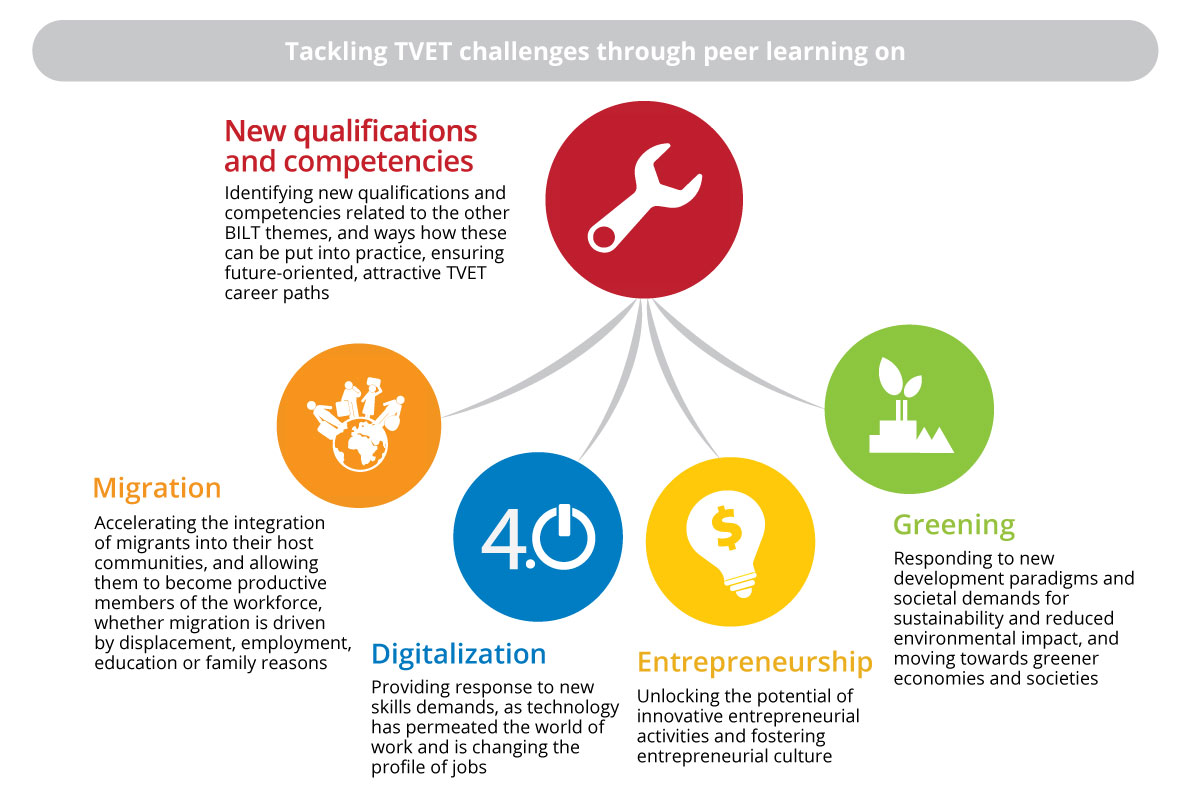
The UNESCO-UNEVOC International Centre: Who We Are | What We Do | Working With Us | Get in Touch
The UNEVOC Network: Learn About the Network | UNEVOC Network Directory
For Members: UNEVOC Centre Dashboard
Thematic Areas: Inclusion and Youth | Digital Transformation | Private Sector Engagement | SDGs and Greening TVET
Our Key Programmes & Projects: BILT: Bridging Innovation and Learning in TVET | Building TVET resilience | TVET Leadership Programme | WYSD: World Youth Skills Day
Past Activities: COVID-19 response | i-hubs project | TVET Global Forums | Virtual Conferences | YEM Knowledge Portal
Our Services & Resources: Publications | TVET Forum | TVET Country Profiles | TVETipedia Glossary | Innovative and Promising Practices | Toolkits for TVET Providers | Entrepreneurial Learning Guide
Events: Major TVET Events | UNEVOC Network News

Achievements and next steps
UNESCO-UNEVOC's Bridging Innovation and Learning in TVET project supports TVET institutions in addressing challenges related to technological, environmental, and social transformations. Started in July 2019, the project provides TVET stakeholders with a platform for exchange on innovative initiatives implemented at their institutions – within Europe, and in a bridging process with African and Asian partners. To date, the project has brought together 104 institutions from 47 countries in workshops and conferences, identified 25 BILT Innovation and Learning Practices, and conducted a trends mapping study on BILT’s overarching thematic area of new qualifications and competencies.

A key component of the BILT project involves identifying innovative initiatives that address systemic challenges across five thematic areas - new qualifications and competencies, greening, digitalization, entrepreneurship and migration -, to better understand what elements lead to their success and can be transferrable to other contexts. The initiatives selected by UNESCO-UNEVOC as BILT Innovation and Learning Practices improve the relevance of TVET to the needs of economies, societies and the environment. The European examples shared tackle such TVET challenges as the use of advanced technologies, integration of soft skills and entrepreneurial learning, responding to sustainability demands, inclusion of vulnerable groups, individualization of learning, and introduction of new competencies in curricula and training regulations. The collection of 15 additional BILT Innovation and Learning Practices from Africa, and Asia and the Pacific is planned for the first and the second quarter of 2021.
Bridging events
To initiate the bridging process with Europe, two BILT online workshops held in July and September 2020 provided an opportunity for TVET institutions and stakeholders from Africa, and Asia and the Pacific to learn about BILT and discuss their possible engagement in the project. This process will continue in 2021 through two bridging conferences that will enable further inter-regional knowledge exchange and peer learning. In December 2020, the three regions will come together for the Bridging Conference on New Qualifications and Competencies in TVET: success stories at strategic and operational levels. The conference will discuss the identification, integration and implementation of new qualifications and competencies with the global TVET community, especially in Africa and Asia and the Pacific. The discussions will be underpinned by the main outcomes of the recently published BILT trends mapping study.
Trends mapping study
Launched in November 2020, the trends mapping study on new qualifications and competencies was carried out by the European UNEVOC Network and their partners. The study identifies nine trends in new qualifications and competencies shaping the future of TVET, as society, economies and labour markets evolve in ever-faster cycles. The study also explores innovative strategies for integrating these new qualifications and competencies into curricula and training regulations, and into teaching and training through the use of new methods and technologies. Selected working examples of applied projects and initiatives offer a wide range of illustrations.
The BILT trends mapping study constitutes an entry point to the preparation of three practically-oriented guides addressing the needs of TVET stakeholders at three levels: governance, development and implementation of new qualifications and competencies. BILT has also established Expert Groups that will lead the work in this thematic area in 2021. The launch of the practical guides in new qualification and competencies will take place during the BILT Learning Summit in December 2021.
2021: Strengthening bridges
Another major activity planned for 2021 is the enhancement of the BILT online platform with a focus on strengthening TVET community engagement. Building on its previous achievements, the BILT project will further increase peer learning and reinforce online knowledge sharing among TVET stakeholders from different regions. In this spirit, we look forward to a new year full of enriching encounters and working with a strong, collaborative TVET community alongside our UNEVOC Network!